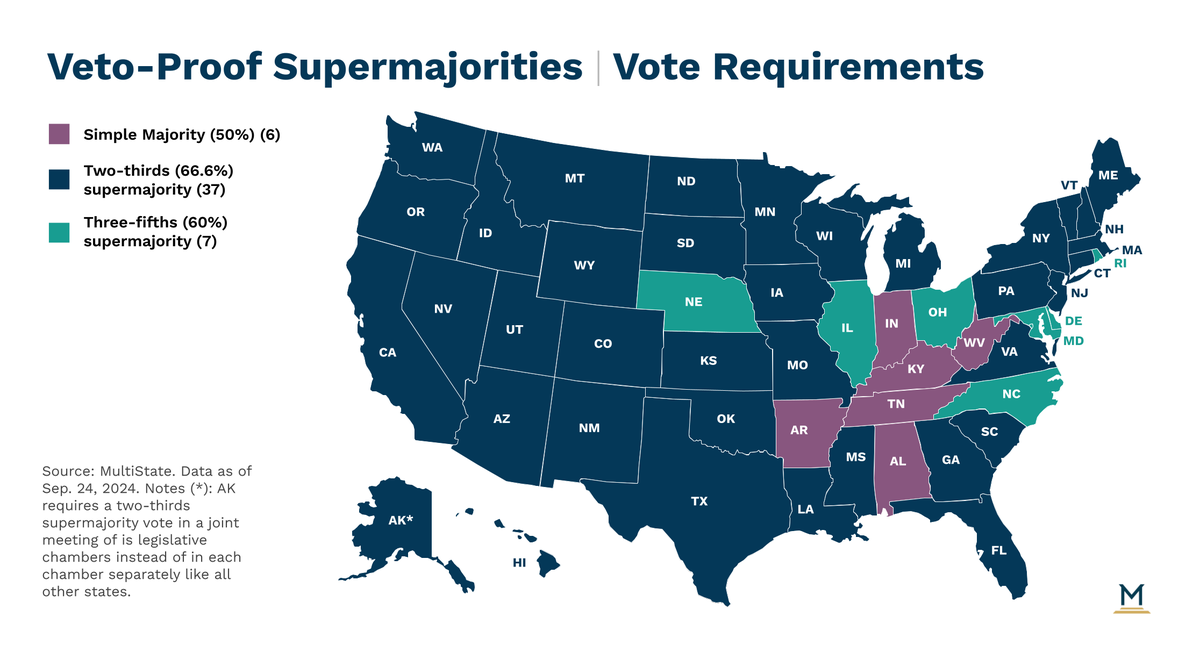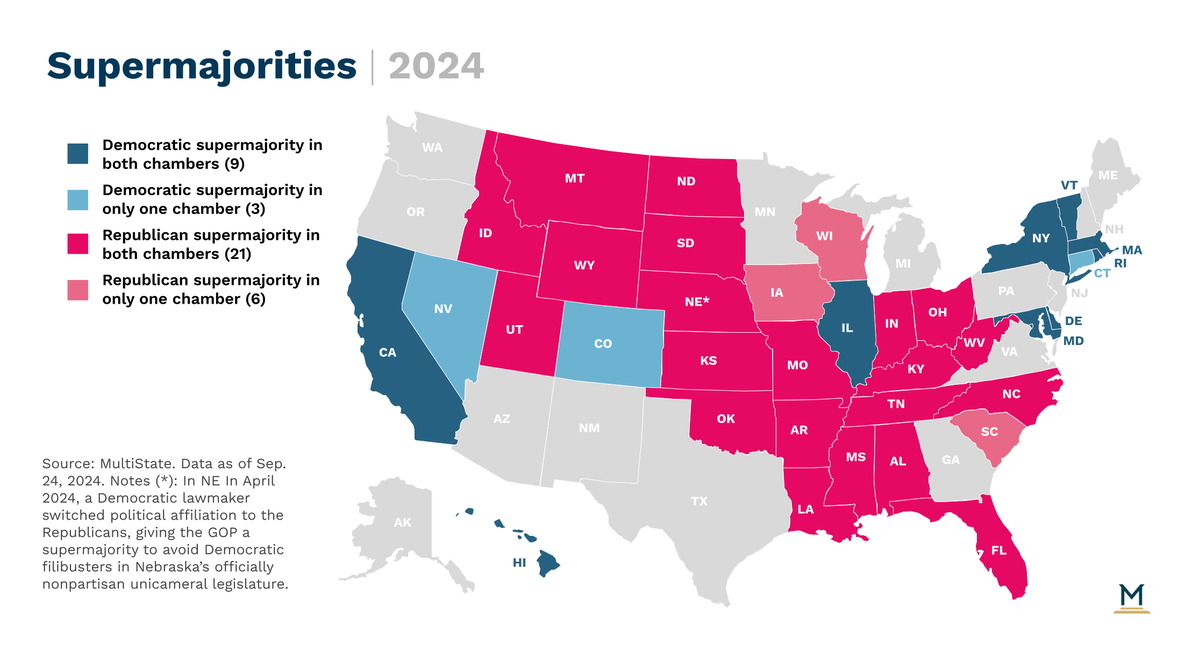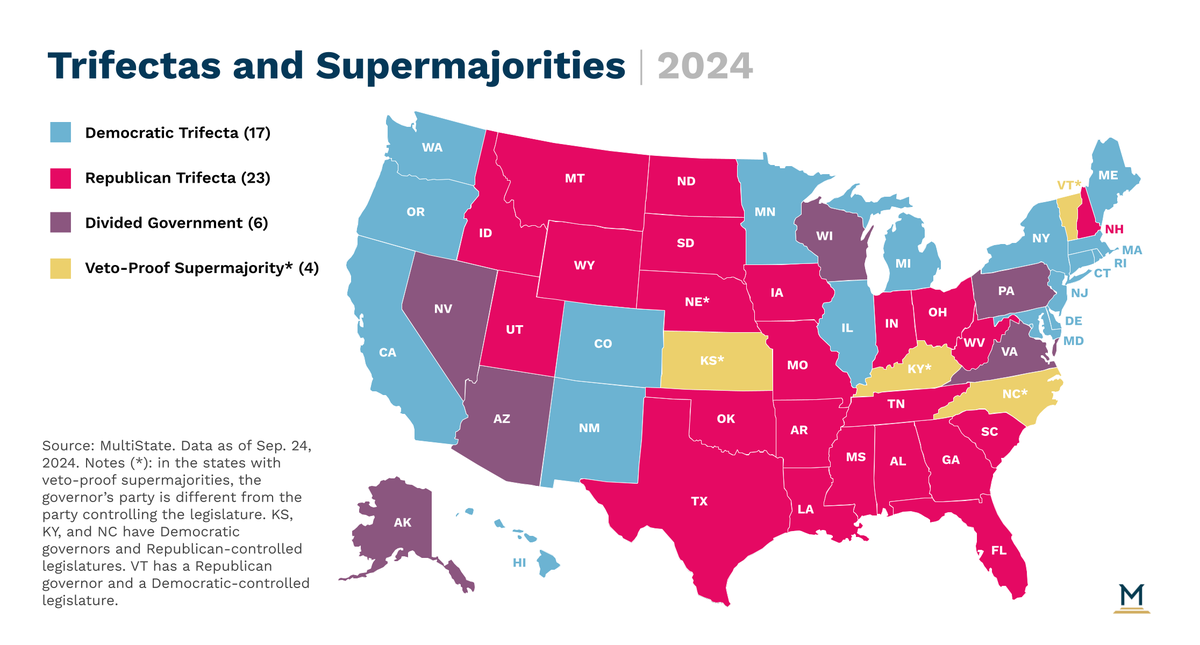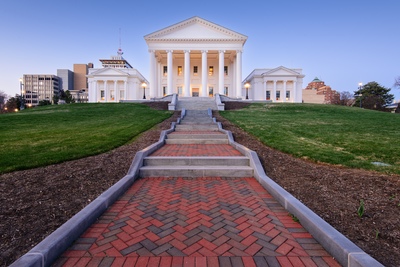
State Government Affairs, Elections & Campaigns
How Lieutenant Governors Are Selected (And Why It Matters)
December 10, 2025 | Bill Kramer
September 27, 2024 | Bill Kramer
-f575f8-1200px.jpeg)
Key Takeaways:
In November, states will hold elections for over 5,807 state legislative seats. And while the headlines will focus on political parties that manage to flip a legislative chamber or two this year, political operatives are also targeting vulnerable supermajorities in November.
Most governors veto legislation passed by the legislature. This gives the executive branch an important role in shaping state laws and a check on the legislative branch. However, every state legislative body also has the power to override a gubernatorial veto if lawmakers can muster a supermajority of votes to do so. The threshold for a veto override is not uniform by state, but most states require a two-thirds vote of each legislative chamber. Seven states require a slightly less super majority of three-fifths, and six states only require a simple majority vote to override a gubernatorial veto.

Currently, Republicans hold veto-proof supermajorities in both chambers of the legislature in 21 states, while Democrats have veto-proof supermajorities in both chambers of 9 states. A supermajority is especially critical in a state where one party controls the legislature but the governor belongs to the other party. That's currently the case in eight states. And in four of those states — Kansas, Kentucky, North Carolina, and Vermont — the party that controls the legislature has the supermajority votes necessary to override the opposing party’s governor — essentially negating the governor’s veto pen and that party’s primary mechanism of blocking the policy preferences of the legislature.

Now, come November, breaking up supermajorities will be a key political objective for the party out of power. Last week, Chaz Nuttycombe, co-founder of state elections forecaster CNalysis, published an in-depth analysis of the legislative races in each state. Part of CNalysis’ forecasts rate the odds of one political party gaining or keeping a supermajority in a legislative chamber.

In Kansas, Democrats would need to flip two seats in the House in order to break up the Republican supermajority. Nuttycombe’s model gives Democrats moderate odds of gaining enough seats to stop Republicans from overriding Gov. Kelly’s (D) vetoes. The other state to watch here is North Carolina, where CNanlysis’ model gives Democrats about a 60% chance of breaking up the Republican supermajority in the House. This could prove vitally important if Attorney General Josh Stein (D) can prevail over Lt. Governor Mark Robinson (R) in this year’s gubernatorial race. And the growing list of Robinson’s scandals could not only bring down his own candidacy but pull down-ballot legislative races along with him.
In the remaining two states that meet our criteria, Kentucky Republicans only need a simple majority in the chamber to override Gov. Beshear (D) and are in no danger of losing it. And Nuttycombe declared the Democratic supermajority in Vermont “nearly unbreakable” this year, despite the popularity of Gov. Scott (R).
Other states to watch include Nebraska, where Republicans recently gained the numbers to block filibusters after a party-switching member came over to their side. CNalysis gives Democrats about a 50% chance of breaking up the supermajority. And in Nevada, Governor Lombardo (R) vetoed a record 75 bills from the Democratic-controlled legislature. But Nuttycombe thinks Democrats could gain a supermajority in the Senate if they can hold on to the current supermajority in the Assembly in what he says “may be the most brutal Democratic state legislative gerrymander in the country.” If you’re at all interested in the legislative elections this year, take a look at CNalysis' full write-up.
This article appeared in our Morning MultiState newsletter on September 24, 2024. For more timely insights like this, be sure to sign up for our Morning MultiState weekly morning tipsheet. We created Morning MultiState with state government affairs professionals in mind — sign up to receive the latest from our experts in your inbox every Tuesday morning. Click here to sign up.

December 10, 2025 | Bill Kramer
-238a17-400px.jpg)
December 10, 2025 | Bill Kramer

November 5, 2025 | Bill Kramer